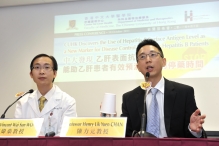CUHK
News Centre
CUHK Discovers the Use of Hepatitis B Surface Antigen Level as a New Marker for Disease Control in Chronic Hepatitis B Patients
Chronic hepatitis B affects about 9% of the adult population in Hong Kong, and it is the commonest cause of liver cirrhosis and liver cancer. Nowadays, oral antiviral drugs are very effective in suppressing the replication of hepatitis B virus (HBV). However, only a small proportion of patients can clear the HBV inside the liver. After stopping the antiviral drug, most patients experience relapse of hepatitis. In other words, doctors and patients have little guidance on when to stop antiviral treatment, and most patients are put on life-long treatment. To understand the timing of stopping antiviral drug, we must be able to estimate the viral control inside the liver. Treatment can only be stopped if most of the virus inside the liver is cleared.
Hepatitis B surface antigen (HBsAg) is a unique protein produced by HBV. The detection of HBsAg indicates HBV infection. Little knowledge is known on the meaning of the level of HBsAg. In 2007, the Center for Liver Health at The Chinese University of Hong Kong (CUHK) has demonstrated a higher level of serum HBsAg reflected a higher level of HBV inside the liver. Following this finding, the researchers from the Center have conducted a series of studies to evaluate the usefulness of HBsAg level to monitor disease control in chronic hepatitis B.
The serum HBsAg level was studied in 103 chronic hepatitis B patients who have not received any antiviral treatment between 1997 and 2008. During a follow-up period up to 11 years, 12 patients had cleared HBsAg, which is an ultimate marker of immune control. A single HBsAg level of ≤100 IU/ml at the first clinic visit can predict a higher chance of HBsAg clearance. 9 of the 12 (75%) patients who had HBsAg clearance versus 8 (9%) of 91 who remained HBsAg positive had serum HBsAg ≤100 IU/ml (p<0.001). Hence, a low serum HBsAg level ≤100 IU/ml indicates a better chance of immune clearance of the virus.
As serum HBsAg level can reflect a good immune clearance of the virus, our researchers evaluated the usefulness of serum HBsAg monitoring among 53 chronic hepatitis B patients who were treated by lamivudine for an average of 3 years and followed up after treatment was stopped. 7 of the 9 (78%) of patients who achieved HBsAg of ≤100 IU/ml at the end of lamivudine treatment did not have disease relapse 1 year after stopping lamivudine, while 42 of the 44 (95%) patients who had HBsAg >100 IU/ml at the end of treatment have disease relapse (p<0.001). At 5 years after stopping lamivudine, 88% of patients who had HBsAg ≤100 IU/ml at the end of treatment remained in disease remission.
In conclusion, serum HBsAg level is a new marker to indicate viral clearance inside the liver. An HBsAg level of ≤100 IU/ml is a good indicator of viral clearance among patients with and without antiviral treatment, and it is a good predictor for disease control after stopping antiviral therapy. Therefore, CUHK recommends regular monitoring of serum HBsAg in chronic hepatitis B, particularly among patients who are on antiviral drugs to decide the timing of stopping therapy.
Professor Henry Lik Yuen CHAN (right), Director, the Center for Liver Health; and Professor Vincent Wai Sun WONG, Associate Professor, Department of Medicine and Therapeutics at CUHK revealed the latest research findings on monitoring of Hepatitis B Surface Antigen Level (HBsAg) as a new marker for disease control in chronic hepatitis B patients.



